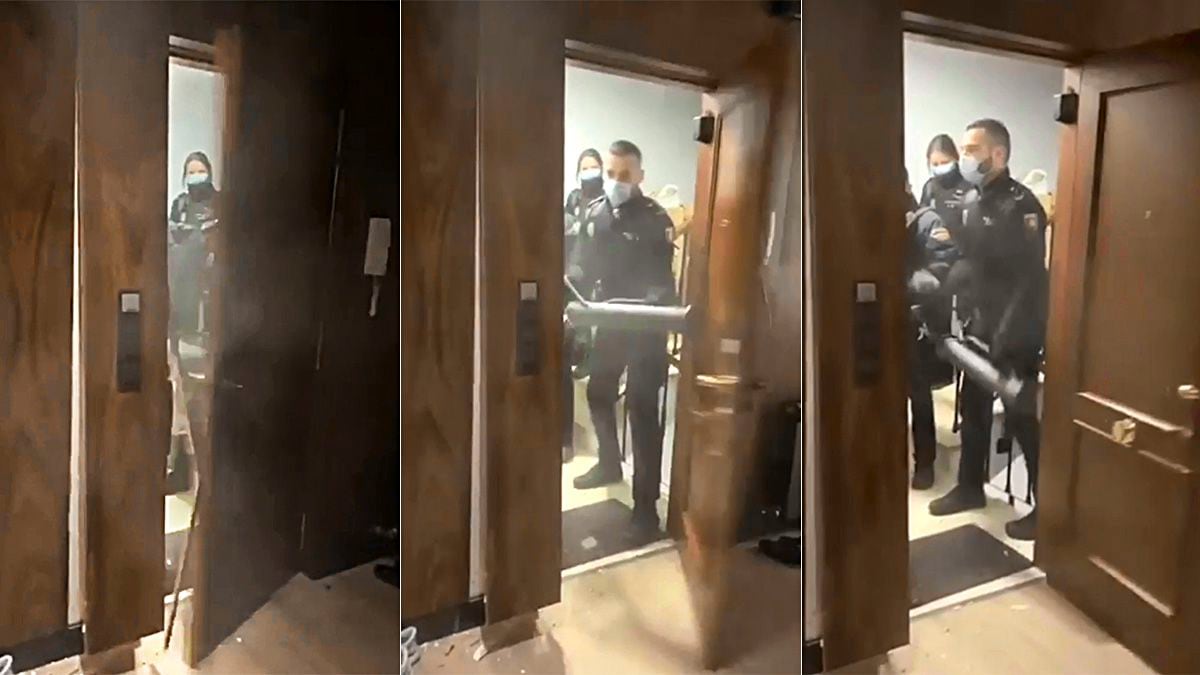The legal case opened for the illegal party held at dawn on March 21 in a flat on Lagasca street, Madrid, in which the police broke down the door without judicial authorization, is entangled in the courts.
While waiting for Judge Marcelino Sexmero, instructor of the case, to take a statement from the nine people who were arrested that night, the Prosecutor's Office has already been against filing it on two occasions, as the defenses of those arrested had requested, alleging that
kick in the door
of the agents had violated the fundamental right to the inviolability of the home. In addition, one of the lawyers has filed a complaint against the six policemen who participated in the operation for a crime of trespassing, according to the judicial documentation to which EL PAÍS has had access.
That police intervention generated a huge controversy after spreading on social networks, days after the event, the images recorded by one of the occupants of the house. The video showed a young woman refusing to open the door if the officers did not carry a warrant. After an exchange of words, the policemen broke down the door. Nine of the 14 people who participated in the party were arrested on charges of a crime of serious disobedience to authority, although they were released hours later. In their report, the policemen stressed that their actions had been protected, among other legal precepts, by the Citizen Security Law, known as the
gag law,
which was endorsed by the Constitutional Court last January.
The agents added in the report that they did not request the entry court order due to "the urgent need" to end the party to avoid the risk of contagion by coronavirus of the participants at a time when meetings in the homes of people not living together. The Ministry of the Interior then defended that the police had acted within the law by entering the house without judicial authorization because it "would not constitute a dwelling" as it is supposedly a tourist property. This argument was publicly rejected by numerous jurists, who appreciated excesses in police action.
The police sent the report of the event to the Castilla square courts, and the case fell on Judge Sexmero, who on April 22 agreed to open proceedings against the nine detainees for the crimes of resistance or disobedience to authority and coercion. In that same order, the magistrate set for the next June 21 and 22 the taking of statements of all of them as well as of three witnesses, among the latter, the two neighbors who alerted the agents of the celebration of a party despite the restrictions of the state of alarm in force at the time and that imposed a curfew and prevented the presence of non-cohabiting people in the same address as measures to prevent the spread of covid-19.The judge also asked the Municipal Police and the National Police to inform him if they had had to intervene previously due to "noise complaints" in the home where the events occurred.
In addition, the order issued the same night as the arrests by a Madrid judge in which he rejected
habeas corpus
(a request by an arrested person to be released on the grounds that his detention has been illegal or arbitrary)
was incorporated into the case.
raised by one of the young women who starred in the incident. In this order, the magistrate concluded that the detention was "in accordance with the law" considering that the woman knew that she was in "a meeting prohibited by law" and that she knew "her obligation to identify herself when requested." That decision was wielded already then by Interior as an endorsement of the legality of the actions of the agents.
Since then, the case has made little progress. Both police forces have sent the court reports in which they assure that, after consulting their files, they do not have any action by their agents in the house on Lagasca Street prior to the illegal party. In addition, the defense of the young woman who requested
habeas corpus
has demanded that the recordings made by the agents with their video cameras be incorporated into the summary, to which time they have appealed the judge's decision to initiate the proceedings on the grounds that they were not the crime of disobedience of which his client is accused occurred. The lawyer for a second defendant has also requested the file of the case.
To both remedies, the Prosecutor's Office has opposed, considering that there are “indications” that the occupants of the house could have committed a crime of disobedience when they refused to open the door to the police and identify themselves. The public prosecutor insists in his writings on the need to continue investigating to "clarify the circumstances" before deciding whether to continue the investigations to hold trial or to archive them. The judge has not yet ruled on the two file requests.
Nor has it done so about the complaint filed by one of the defenses against the six agents who intervened to end the illegal party. In it, the agents are accused of a crime of trespassing, considering that that day they were not legally authorized to break down the door and enter. The complaint, which fell to another court in Madrid, has been sent to Judge Sexmero who, in view of it, recently decided to postpone without date the statements of the nine investigated and three witnesses. Juan Gonzalo Ospina, the lawyer who has filed this complaint on behalf of one of the defendants, has declined to comment on the details of the complaint to this newspaper.

